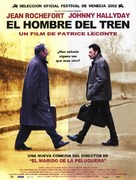Reviews provided by RottenTomatoes
Wesley Morris, Boston Globe: Real depth here is short-circuited by florid editing and a general hokiness that undermine the unlikely rapport Hallyday and the lovely Rochefort forge. Read more
Terry Lawson, Detroit Free Press: The movie has the kind of texture and depth that will make true movie-lovers sigh with the pure cinematic, human grace of it all. Read more
Rene Rodriguez, Miami Herald: Under Leconte's artful direction, a believable bond develops between the men, each envious of the direction the other's life has taken. Read more
Richard Roeper, Ebert & Roeper: [A] beautiful and quirky fable that's part spaghetti Western, part French poem. It's an unlikely but lovely combination. Read more
Michael Wilmington, Chicago Tribune: The movie -- simple, pure and powerful -- makes us feel the intensity of both life in transit and life lived, if only for a moment, in another's skin. Read more
Elvis Mitchell, New York Times: Mr. Leconte gives this meeting of opposites in Claude Klotz's script a lovely, sportive elan, instead of making it register as lumpy, obvious polemics. Read more
Eleanor Ringel Gillespie, Atlanta Journal-Constitution: No one mixes graceful melancholy and bittersweet comedy better than Leconte. Read more
Manohla Dargis, Los Angeles Times: As a filmmaker, [Leconte] doesn't have anything profound to say but does say his something with craft, visual flair and professionalism. Read more
Lisa Kennedy, Denver Post: It is a perfected fable flashing across a screen. Read more
Lisa Schwarzbaum, Entertainment Weekly: The premise, the structure, and the men-at-twilight conversation in Patrice Leconte's ingratiating drama feel cloyingly predetermined at times, but the sight of Hallyday and Rochefort luxuriating in their contrasting manly personas is a kick. Read more
Philip Wuntch, Dallas Morning News: In the context of French filmmaker Patrice Leconte's canon, Man on the Train qualifies as an anecdote. But it may stay with some viewers longer than an epic poem. Read more
Ella Taylor, L.A. Weekly: It speaks to the quixotic desire to know what it feels like to be someone else, someone utterly different from ourselves -- the reason we talk to strangers, the reason we go to the movies. Read more
Jan Stuart, Newsday: Patrice Leconte's fanciful odd-couple drama oozes flavorful, provincial atmosphere. Read more
Bob Campbell, Newark Star-Ledger: Two magnetic male presences command the screen in Man On the Train, but Patrice Leconte finds a friendship between weathered Frenchmen more difficult to forge than the far more asymmetrical relationships of previous films. Read more
Jami Bernard, New York Daily News: The movie's slow pace and gentle humor pay off in a pounding cross-cutting between the heist and the surgery, as well as a transcendent ending that is as rewarding as it is ambiguous. Read more
V.A. Musetto, New York Post: A literate story that relies on a thoughtful script and the work of two exceptional performers. Read more
James Berardinelli, ReelViews: We come to like these two men and look forward to their interaction with a quiet anticipation. Read more
Roger Ebert, Chicago Sun-Times: One of [Leconte's] most elegant films. Read more
Mick LaSalle, San Francisco Chronicle: Taps into the same emotional current that sustains the entire 'buddy picture' genre, but does so with feeling and unmistakable insight. Read more
David Edelstein, Slate: Quintessentially (in places, ludicrously) French yet is suffused with a tender Yank envy. Read more
Jeff Strickler, Minneapolis Star Tribune: For the most part, [Leconte] pulls back and lets the two stars do their thing. And they do it marvelously. Read more
Rick Groen, Globe and Mail: Man on the Train is a contemplative ride through a province that expands with age -- the sad-eyed land of might-have-been. Read more
Geoff Pevere, Toronto Star: The movie is as contemplative, gentle, and subdued as it is understatedly funny. Read more
Richard Schickel, TIME Magazine: An elegantly polished little film. Read more
Jessica Winter, Village Voice: Collapses in a heap of affirmational outbursts and metaphysical goop. Read more

